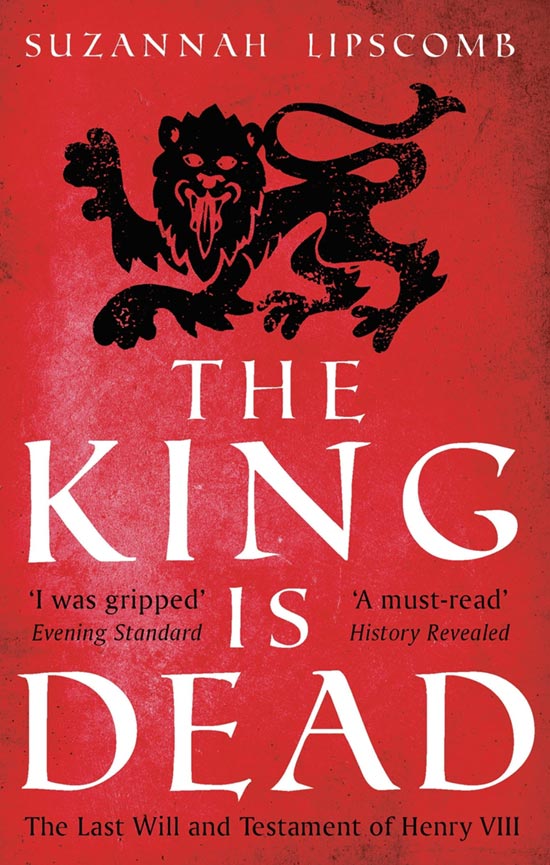The King is Dead:
The Last Will and Testament of Henry VIII
Henry VIII’s last will and testament, drawn up a month before his death, is one of the most intriguing and contested documents in British history. Given special legal and constitutional significance by the 1536 and 1544 Acts of Succession which allowed Henry VIII to nominate his successor by his last will, it is unique among royal wills in the extent its author tried to rule from beyond the grave.
It has also been the source of great controversy. It was called on to justify both the erection and the dissolution of the Protectorate of Edward Seymour, was overruled to enable the accession of Lady Jane Grey, and was deemed invalid by the supporters of Mary, Queen of Scots.
In the centuries since, historians, too, have disagreed vehemently over its intended meaning, its authenticity and validity, and the circumstances of its creation.
Book of the Year 2015: ‘I was gripped by Suzannah Lipscomb’s The King is Dead, an elegantly written forensic examination of Henry VIII’s last will and testament, one of the most significant constitutional documents in British history.’
Saul David, Evening Standard
What’s new about this book?
The prevailing orthodoxy, until now, has been that the will was the product of a conspiracy staged by a reforming religious faction at court led by Edward Seymour, Earl of Hertford and Sir William Paget. Hertford and Paget are thought to have manipulated Henry into ruling out certain of their enemies from joining the regency council that Henry prescribed for the rule of his son, Edward, and to have tampered with the will to include forged clauses that would facilitate their assumption of power after the old king’s death in the early hours of 28 January 1547.
This exciting book sets out to question this orthodoxy. Suzannah Lipscomb seeks to demonstrate that the case for a conspiracy is based on some critical historical errors and that the accumulated evidence points persuasively in a very different direction. The inescapable conclusion is that no such elaborate conspiracy theory is needed nor justified to explain the events of the last months of Henry VIII’s life, nor the creation of his last testament. Henry VIII’s will was quite literally his will: the product of his volition alone.
Buy The King is Dead
It is available from all good booksellers – support your high street!
Also order online from
What are people saying about the book?
Lipscomb ‘deserves admiration for taking on some of the heavy-hitters among Tudor historians and for holding her own….This is a book that deserves to be read. Lipscomb has produced an entirely credible interpretation of a contentious issue. Her sober but still engaging prose thankfully lacks that sweet sentimentality that so often characterises popular histories of the Tudors. Her analysis of the available documents seems sturdy. With admirable authority, she provides an interesting allegory about how misplaced trust can undermine the best-laid plans of a powerful king.’
Prof. Gerard DeGroot, The Times
‘Scholars have long jousted over the provenance, authenticity and validity of Henry VIII’s 1546 will, making it one of the most contested documents in British history. Lipscomb approaches the debate as a series of ‘mysteries to be solved’, bringing us directly into the corridors of sixteenth-century English power by supplying, in an appendix, the document itself. …Challengers to the will’s validity contend that a cabal of courtiers took advantage of a fading monarch to manipulate the endgame. But Lipscomb makes the case that the will was exactly as a dying but still leonine Henry wished it… Both wonkish and elegant, The King is Dead allows us a peek inside.’
Jean Zimmerman, New York Times Book Review
‘This well-researched book provides an alternative scenario for the preparation and execution of Henry VIII’s will. Readers of Tudor England and English history will find this to be a fascinating story.’
Library Journal
‘Nimbly scrutinizes Henry VIII’s unusual final will to lend insight into the king’s state of mind and religious beliefs during the last months of his life while also settling potential timeline incongruities.’
Publishers Weekly
‘A detailed, forensic approach to dismantling the popular conspiracy theories about certain factions messing with Henry’s will. A great bit of scholarship that Tudor fans will need on their shelves.’
British Heritage Travel
‘The author, who shows her deep knowledge of the Tudor period throughout the book, rejects the many charges that Henry VIII’s will might have been changed or altered or that undue influence was used… A delightful story of intrigue and manipulation.’
Kirkus Reviews
‘A gripping, forceful and forensically detailed investigation into the most controversial document of Henry VIII’s reign’.
Jessie Childs
